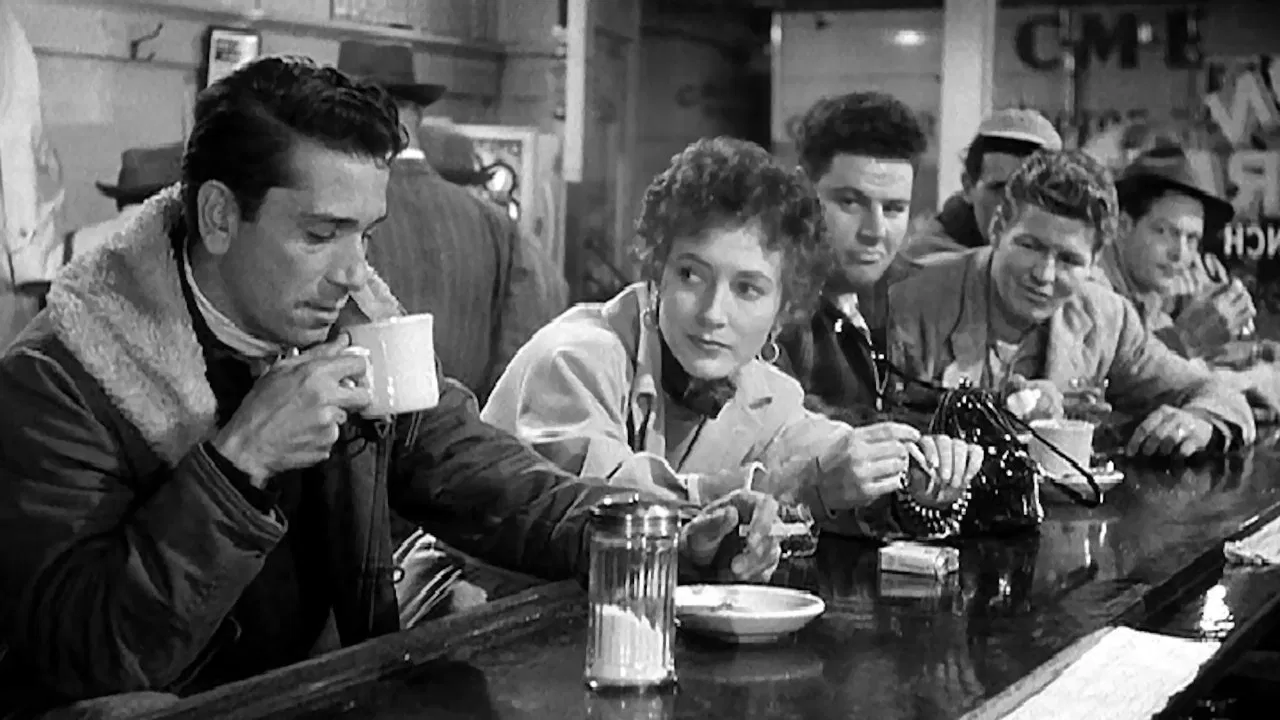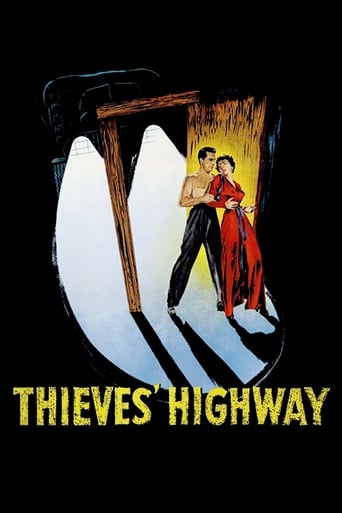

What a waste of my time!!!
... View MoreThe biggest problem with this movie is it’s a little better than you think it might be, which somehow makes it worse. As in, it takes itself a bit too seriously, which makes most of the movie feel kind of dull.
... View MoreIf you're interested in the topic at hand, you should just watch it and judge yourself because the reviews have gone very biased by people that didn't even watch it and just hate (or love) the creator. I liked it, it was well written, narrated, and directed and it was about a topic that interests me.
... View MoreStory: It's very simple but honestly that is fine.
... View MoreYou really don't want to believe that dirt bags like Mike Figlia hold sway in real life, but this film from 1949 is a pretty good reminder that they're out there looking for a cheap angle any way they can get it. Lee J. Cobb does a try out here for his later role as a corrupt union boss in 1954's "On The Waterfront" and he's a real creep, attempting to steal Nick Garcos' (Richard Conte) load of apples right out from under him. Figlia throws everything at him including a hooker, a hatchet to his truck tires, and a pair of goons that roll him for his cash, while the determined Greek trucker keeps bouncing back each time.One of the surprises here was how quickly Nick's girl Polly (Barbara Lawrence) from back home throws him over when she finds out he got robbed and winds up stranded in San Francisco. So much for true love finding a way. But then you've got hooker Rica (Valentina Cortese) who makes the big play for Nick and has a hand in redeeming the both of them. I don't know that I'm buying the feel good ending with Nick and Rica going off to live happily ever after, but up till then the film's gritty realism and treatment of corruption in the produce market made for an effective noir tale.For another compelling story of wildcat truckers you might look up Humphrey Bogart and George Raft in the 1940 film "They Drive By Night", with a truly over the top performance by Ida Lupino in a courtroom scene following the death of her husband played by Alan Hale. Bogey and Raft portrayed a couple of brother truckers in that one, hauling lemons instead of apples, but otherwise working long and hard, determined to make that one big score.
... View MoreWhen happy-go-lucky war veteran Richard Conte comes home, he is upset to find out that his aging father has lost his legs as a result of a trucking accident he had while attempting to make a delivery to San Francisco. He decides to confront the big boss (Lee J. Cobb) and buys his own truck so with the help of his father's old partner (Millard Mitchell), he can go there on the pretense of delivering apples. Trucking requires a lot of energy to prevent the driver from falling asleep, and getting to San Francisco is half the battle. Two men (Joseph Pevney and Jack Oakie), double-crossed by Mitchell, stalk him, while up at the Embarcadero, Conte finds Cobb more than ready to challenge him. But Cobb underestimates him, especially when he tries to use an obvious street walker (Valentina Cortese) in his efforts to get Conte out of his hair.This is a realistic and gritty drama that doesn't leave any stone unturned in exposing the rackets involved in a tough occupation. There's enough violence here to expose the seemingly innocent businessmen for being the mobsters they really are, and how the little man always suffer under the hands of these crooks. Conte is excellent, with Cortese memorable as a femme fatal who has more up her sleeve than the man paying her off realizes. Some of the violence is very shocking, and there's a very brutal ending for one of the major characters, as well as a confrontation with a horrifying pay-off for a certain villain. Barbara Lawrence is memorable as Conte's fiancée, while future "Caged" matron Hope Emerson has a nice small role as one of Cobb's no-nonsense customers. Morris Carnovsky gives vulnerability to the part of Conte's handicapped father. Don't let the happy opening fool you. There's little to be happy about throughout 95 percent of the movie, yet something about the way it was written, directed and filmed shows a minor masterpiece that you might not put at the top of your list to watch over and over, but you'll certainly never forget it.
... View More**SPOILERS*** Hard hitting revenge flick with Richard Conte as the two fisted golden delicious apple importer Nick Garco who's home from the war after seeing action in Europe only to get himself involved in a war back home. Nick who seems to have trouble keeping his shirt on in the movie obviously in order for him to show off to the audience and his co-star San Francisco street walker Rica, Valntina Cortess, what a perfect physique he has. Filled with rage over what happened to his old man Yarko Garcos, Morris Carnovsky, Nick plans to take on double-dealing fruit & vegetable dealer Mike Figlia, Lee J. Cobb, who screwed Yarko out of his hard earned cash. That all happened in an underhanded tomato delivery deal that Yarko made to his fruit & vegetable storehouse in SF. Not only that the sleazy and conniving Figlia got Yarko good and drunk and put him behind the wheel of his delivery truck where he ends up driving off the road and losing his legs when the truck landed on him.Getting together with his dad's friend and partner in the fruit & vegetable business Ed Kinney, Millard Mitchell, Nick gets two truckload, him & Ed, of golden delicious apples that's worth their weight in gold from a secret apple orchard in Fresno and drives up north to SF in order to sell them at a very hefty profit. It's also in SF that Nick's finally gets to meet the two timing, in how he does business, Mike Figlia in order to pay him back for what he did to his old man and get the money, for the tomato shipment, that he robbed him out off.Smelling trouble, in how aggressive Nick comes on to him, Figlia gets local hooker Rica to soften him up, by bedding him down, while he and his henchmen try to steal his truckload of expensive golden delicious apples. This devious plan on Fghia's part is soon to backfire on him in Rica falling in love, by seeing just what a hunk of a man he is, with Nick and telling him what Figlia has planned for him!We still have Nick's partner in the fruit & vegetable business to worry about in him driving his truckload of golden delicious apples to the San Francisco market on his dilapidate jalopy of a truck that, as Ed says, he keeps from falling apart with spit! As you would have expected the truck ends up rolling off a cliff when it's brakes, that were held together with chewing gum, gave out thus killing Ed when the whole damn thing exploded on top him! Nick himself got worked over by two of Figlia's hoods who took the money, in both cash & check, that he made, by threatening to crack his skull, Figlia pay him for stealing his apples as well as what he did to his dad Yanko in the crooked tomato exchange deal he pulled on him.***SPOILERS*** The end of the movie couldn't have come soon enough with Nick now back and on top of his game, after recovering from the beating that Figlia's hoods gave him, confronting Figlia at a San Francisco watering hole and beating the living hell out of him while his boys just stand there without as much as lifting a finger to help him! With his mission now completed in both delivering the golden delicious apples to market and getting his and his dad's money back from the now beaten battered and arrested, by the SFPD for racketeering and extortion, Figlia Nick can finally go back home to Fresno and enjoy the "fruits" of his labor. Nick now together with his new found love Rica whom he traded his snotty and full of herself girlfriend Polly, Barbara Lawrence, for drives into the sunset with his truck to pick up a new shipment of golden delicious apples for his thousands of apple hungry costumers all over the state who just can't get enough of them.
... View MoreNick Garcos (Richard Conte) returns from a round-the-world engagement to a home that, at first glance, typifies the ideal American household. His father's working-class singing voice booms across the backyard; his mother fussily busies herself with the daily chores; his girlfriend Polly (Barbara Lawrence) bursts jubilantly into the room, embracing him in a passionate, sensuous kiss. But looks can be deceiving: a well-intended gift of Chinese slippers betrays a recent family tragedy; Polly's disappointed response to another gift hints at a fractured romance, a relationship borne not from love but the love of money. The family's facade of happiness is exposed as a sham, and it's the peeling back of this superficial skin with which Jules Dassin's 'Thieves' Highway (1949)' is concerned. A seemingly-innocuous industry, that of fresh fruit cartage and wholesale, is shown to wallow in depravity, thuggery and callous opportunism. In this way, the film might be considered a companion piece to the director's previous effort, 'The Naked City (1948),' which similarly exposed gruelling drama within the confines of the audiences' daily lives.Richard Conte was one of the most interesting leading men of his era. His big-shot crime boss in 'The Big Combo (1955)' might be the decade's most charismatic villain, but he could also play the resolute hero, as in Preminger's 'Whirlpool (1949).' To 'Thieves' Highway' he brings a cocky self-assurance, the sort of fearless conviction that's bound to blow up in one's face eventually. Lee J. Cobb's conniving fruit wholesaler, Mike Figlia, is a small-time crook, but one who invokes the viewer's contempt through his ruthlessly-capitalist exploitation of the humble working-class American. Only the females aren't as memorably drawn: Barbara Lawrence's Polly is rather abruptly discarded as a self-seeking gold-digger, as though only to allow for a romance with possible prostitute Rica (Valentina Cortesa), who grows a heart of gold. 'Thieves' Highway' no doubt inspired Henri-Georges Clouzot's nail-biting 'The Wages of Fear (1953),' another classic tale of trucking peril, but unfortunately it itself lacks the French director's gritty cynicism, or at least a degree of pessimism as absolute as Clouzot's.This slackening of tone is seen most tellingly in the film's dramatic climax, a confrontation between Garcos and Figlia. The sequence doesn't work because it's conflicted between two opposing moral viewpoints. In one sense, Dassin appears to advocate Garcos' vigilante action in subjecting Figlia to a physical beating, since he successfully reclaims his stolen payments and achieves some degree of mental closure regarding his father's crippling. However, at this moment, as Garcos collapses onto the bench in exhaustion, policemen enter the diner and arrest Figlia for his crimes – but not before one officer sternly wags his finger at Garcos for taking the law into his own hands. To have an excellent film intruded upon by such an awkward, juvenile moral lesson is bad enough, but the film could have gotten across the same message in a more powerful manner. As the police stormed into the diner, my blood had suddenly run cold with the chilling thought: what if Figlia is dead? Out of pure bloody-minded pride, a good man would have been condemned for life, the ultimate testament that vigilantism is not the answer.
... View More